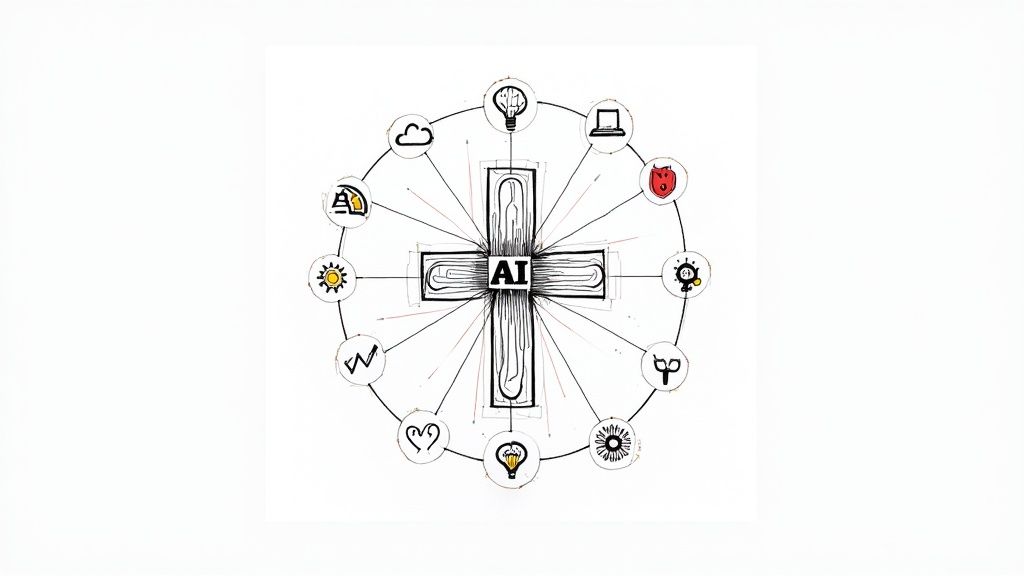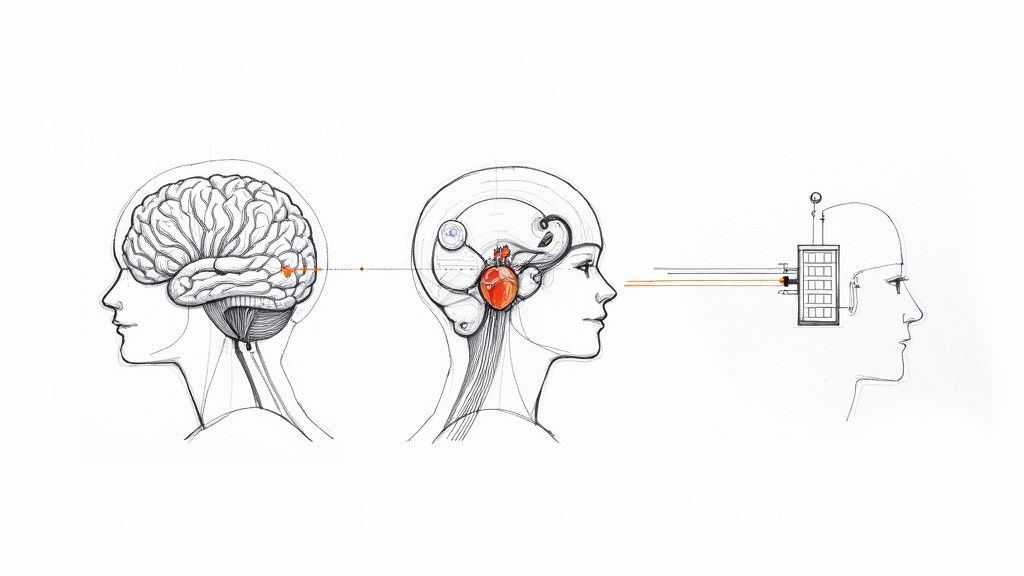AI Consulting for Businesses Strategic Guide
Unlock growth with our guide to AI consulting for businesses. Learn how to choose a partner, implement AI strategy, and measure your true business impact.
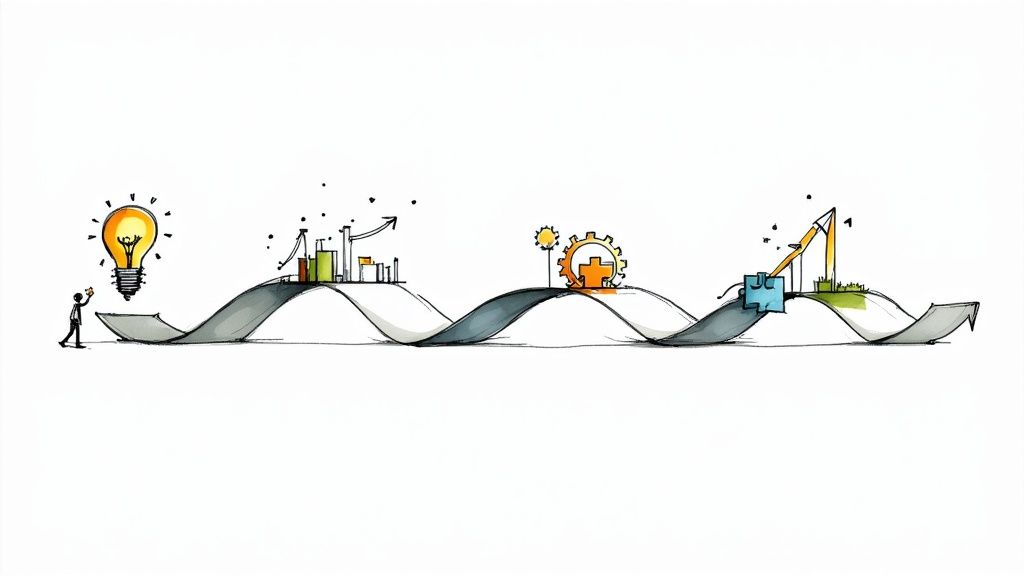
AI consulting is much more than just a service; it's a strategic partnership. Think of it as bringing in an expert guide to help you use artificial intelligence to solve your biggest challenges and uncover new opportunities. It’s less about simply buying software and more about creating a customised blueprint that weaves AI into the very fabric of your business to make you more efficient and drive real growth.
What Is AI Consulting for Businesses?

Imagine you’ve been given a pile of premium parts to build a high-performance race car. You have a powerful engine, a state-of-the-art chassis, and the best tyres on the market, but you don't have an expert mechanic to put it all together. This is exactly what many companies face when they first dip their toes into artificial intelligence. AI consulting for businesses is that expert mechanic and race strategist, all rolled into one.
This isn't just about someone recommending the latest technology. An AI consultant becomes a genuine partner, taking the time to understand the unique DNA of your organisation—your goals, your pain points, and how you actually get work done day-to-day. Their job is to translate the often-confusing world of AI into practical solutions that make sense for you.
At its core, this partnership is all about creating tangible value. It’s not about chasing trends or implementing AI for its own sake. It’s about solving real-world problems that are holding back your growth and hurting your bottom line.
The Role of an AI Consultant
An AI consultant has to wear a lot of hats, blending deep technical knowledge with a sharp business mind. Their main job is to act as the bridge between your business goals and the possibilities of AI technology. They’re there to guide you through the entire process, from that first spark of an idea all the way to a full-scale rollout and beyond.
To give you a better idea of what they do, we've broken down their primary services into a few key areas.
Core AI Consulting Services Overview
Service Area Description Business Impact
Strategy & Roadmapping
Defines what success with AI looks like for your business and creates a step-by-step plan to get there.
Provides a clear, actionable path to AI adoption, aligning technology with long-term business goals.
Use-Case Identification
Pinpoints the most valuable opportunities for AI within your operations, focusing on high-return projects first.
Ensures resources are invested in projects that will deliver the most significant, measurable improvements.
Data Readiness Assessment
Evaluates your current data systems and practices to see if they can support AI, and plans any needed upgrades.
Prevents project failure by ensuring the foundational data quality and infrastructure are solid.
Implementation & Oversight
Manages the entire project, coordinating between your teams and tech experts to ensure a smooth launch.
Reduces risk and complexity, ensuring the AI solution is delivered on time and on budget.
These services show how an AI consultant works to turn the abstract concept of "using AI" into a concrete plan that delivers results.
An AI consultant’s real value is their ability to demystify complexity. They transform the abstract concept of "using AI" into a concrete plan that generates measurable results, like increased efficiency, new revenue streams, or a stronger competitive edge.
The demand for this kind of expertise is exploding. The global AI consulting services market was valued at USD 8.75 billion and is forecast to climb to an incredible USD 58.19 billion by 2034. This staggering growth shows just how much businesses, particularly in competitive markets like Germany, are relying on specialist firms to navigate their AI journey. You can explore more data on this expanding market to get a feel for its trajectory.
Beyond Technology Implementation
It’s a common mistake to think that AI consulting is all about the tech. While technology is obviously a huge part of it, a truly great consultant puts just as much focus on the human and strategic side of things. They help with change management, making sure your team feels prepared and confident in using the new AI-powered tools.
Ultimately, engaging in AI consulting for businesses is an investment in making your company resilient and ready for the future. It gives you a powerful strategic advantage, helping you not just keep up with the changes in your industry, but lead them.
Knowing When to Hire an AI Consultant
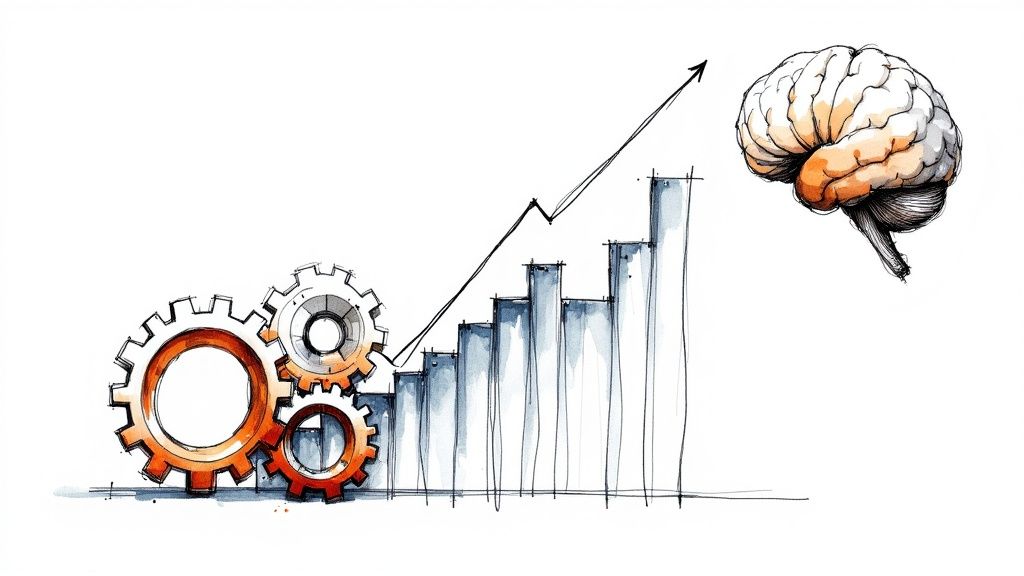
Taking the leap into artificial intelligence is a big decision. But the real game-changer is knowing the exact moment to bring in outside help. Most businesses eventually hit a wall where their internal teams, however talented, just can't keep up with their AI ambitions or the pressures of the market. This is when AI consulting for businesses goes from a "someday" idea to an urgent priority.
The signs aren't always glaringly obvious. They often show up as persistent, frustrating problems that your current tools and methods just can't seem to solve. These nagging pain points are usually the clearest signal that you have an “AI-shaped” problem that needs a specialist's touch.
Identifying Your Tipping Point
Take a moment to think about the chronic issues holding your business back. Are there operational bottlenecks that bleed time and money? Or maybe you see clear growth opportunities that feel tantalisingly out of reach? These are precisely the kinds of challenges where an AI consultant can make a huge, immediate difference.
Let's ground this in a few real-world scenarios:
- A retail business might be stuck in a cycle of bad inventory forecasting. One minute, your warehouse is overflowing with products nobody wants; the next, you've run out of your bestsellers, leaving customers frustrated and sales on the table.
- A logistics firm could be battling inefficient delivery routes. Drivers are stuck in traffic or taking roundabout journeys, which sends fuel costs soaring and leads to late deliveries that damage your reputation.
- A financial services company might be sitting on a goldmine of customer data but have no idea how to refine it. Without the right tools, you're missing out on vital insights for personalised offers, better risk models, and spotting fraud.
In every one of these cases, the problem has become too complex for spreadsheets and manual work. The business needs a smarter, more powerful way to cut through the noise and find a real solution.
The right time to hire an AI consultant is when you can point to a specific problem that, if solved, would fundamentally change your business for the better—but you don’t have the in-house skills or a clear roadmap to get there on your own.
At this point, you can reframe AI consulting for businesses in your mind. It’s no longer just an expense; it's a strategic investment targeted at fixing something that is actively holding you back.
From Pain Points to Strategic Action
Seeing these problems is the first step. The next is connecting them to the wider symptoms that tell you it's time to call in an expert. If any of the following feel uncomfortably familiar, you’ve probably reached the point where a consultant can provide enormous value.
Key Signals It's Time for AI Consulting
- Growth Has Stalled or Efficiency is Dropping: Your key metrics have hit a plateau or are heading in the wrong direction. You've tried all the usual fixes to boost productivity or sales, but the needle just won't budge.
- Your Competitors Are Pulling Ahead: You're seeing rivals use technology to offer superior services, faster delivery, or hyper-personalised experiences, and you're finding it difficult to keep pace.
- You're Drowning in Data but Starving for Insights: Your company gathers huge amounts of data, but it sits in silos, completely unused. Your teams are flying blind because they can't turn that raw information into smart, actionable decisions.
- You Don't Have the Right Skills In-House: You have a strong hunch that AI is the answer, but your team simply doesn't have the specialised expertise in data science, machine learning engineering, or AI strategy to design and build a solution that works.
If you see your organisation in these descriptions, it’s a pretty clear sign that the potential return from hiring an AI consultant will far outweigh the initial investment. They act as the bridge, getting you from where you are today to a future where technology is actively powering your business forward.
The AI Implementation Journey, Step by Step
Bringing artificial intelligence into your business isn't a flip-of-the-switch affair; it's a carefully planned journey. Working with an AI consulting partner helps map this out, transforming what seems like a massive technological hurdle into a series of clear, manageable stages. This structured approach ensures every move you make is directly tied to your core business goals.
It all starts with partnership. The consultants get in the trenches with your leadership and on-the-ground teams. The aim is to build a solution that isn't just technically brilliant but also fits hand-in-glove with your company's strategy and culture.
This flowchart gives you a bird's-eye view of the path from identifying a business problem to launching and monitoring a live AI solution.
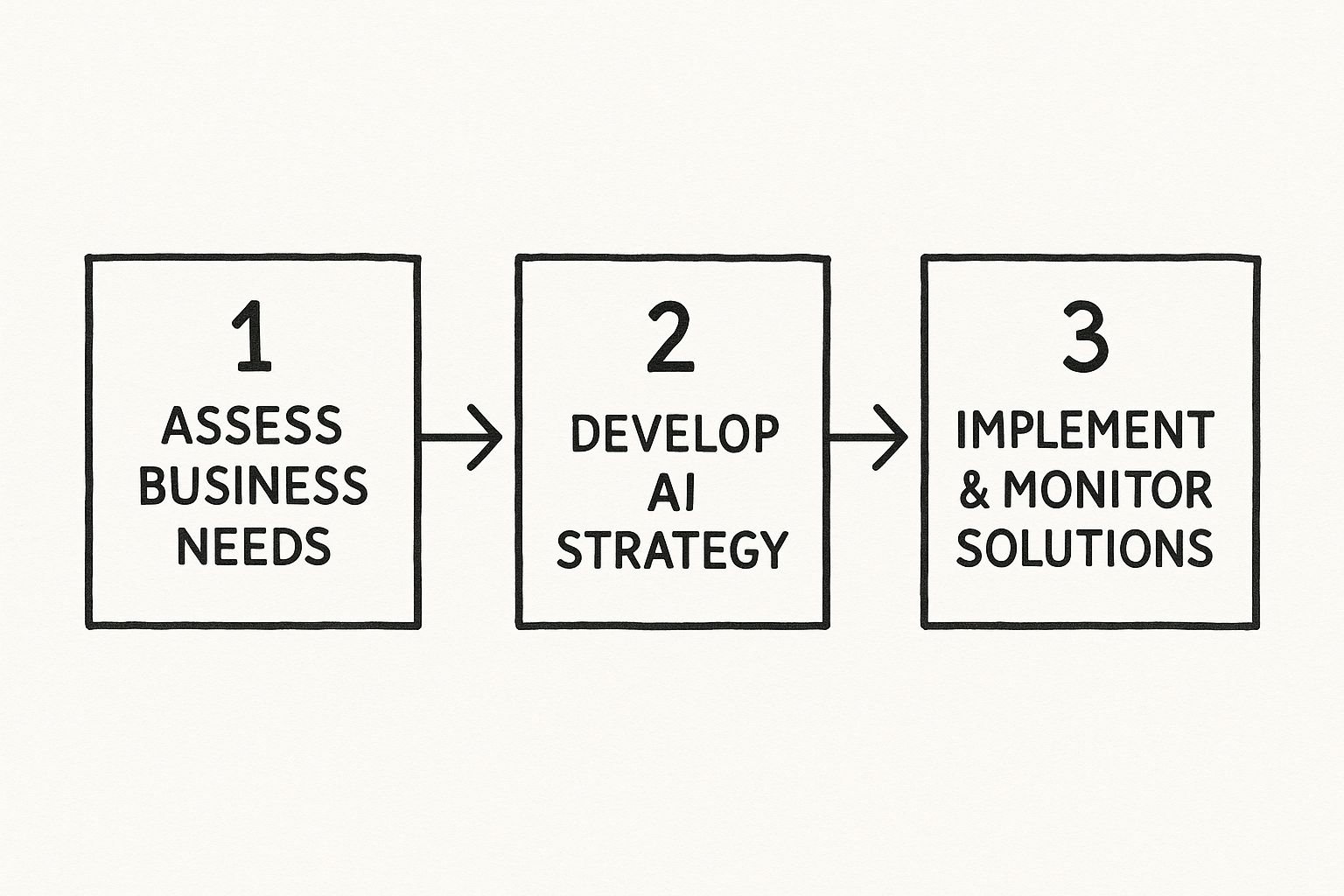
As you can see, it’s a logical progression. Let’s break down what really happens at each of these stages.
Stage 1: Discovery and Goal Setting
The first phase is all about deep listening and getting on the same page. An AI consultant's number one job at the start is to understand your business from the inside out. This means running workshops and having frank conversations with your key people to nail down specific pain points and strategic ambitions.
Think of it less as a technical audit and more as a business-first conversation. The objective is to translate broad goals—like "we need to cut operational costs" or "we have to improve customer loyalty"—into tangible, measurable outcomes that AI can realistically help you achieve.
Stage 2: Use Case Prioritisation
Once the goals are crystal clear, it’s time to hunt for specific opportunities where AI can make the biggest difference. The reality is, not all AI projects are created equal. An experienced consultant helps you sift through the possibilities and prioritise them using a simple but powerful matrix: high business impact versus low implementation risk.
This is how you find a "quick win"—a pilot project that has a high chance of success and shows undeniable value right away. For example, a manufacturer grappling with expensive machine downtime would likely prioritise an AI-powered predictive maintenance system over a more complex, customer-facing chatbot. The immediate, tangible benefit is obvious.
A successful AI journey starts with a single, well-chosen pilot project. Proving value on a small scale builds momentum, secures stakeholder buy-in, and provides invaluable learnings for future, more ambitious rollouts.
Stage 3: Proof of Concept Development
With a high-impact use case chosen, the focus shifts to building a Proof of Concept (PoC). A PoC is essentially a small-scale, working prototype of the AI solution. It’s designed to test if the idea is truly viable in a controlled setting, using your own data to prove that the proposed approach works and can deliver the results you expect.
This step is a critical risk-reducer. It answers the make-or-break questions before you commit serious resources:
- Is our data good enough to support the AI model?
- Can the algorithm actually hit the accuracy targets we need?
- Will this solution play nicely with our existing systems?
A successful PoC provides hard evidence that the investment is sound, building confidence across the entire organisation.
Stage 4: Scaled Rollout and Integration
After the PoC proves its worth, it's time to go big. This stage involves scaling the technology from a pilot into a fully integrated solution, refining the models with more data, and embedding the new tools into your team's day-to-day work.
This is where change management becomes paramount. Good AI consulting for businesses goes beyond the tech; it includes training your staff, updating workflows, and ensuring a smooth transition. The goal is to make the AI tool feel like a natural part of how your company gets things done. A solid AI strategy is the bedrock for this phase; you can get more guidance on creating one by exploring our deep dive into AI strategy development.
Stage 5: Ongoing Optimisation and Governance
AI is not a "set it and forget it" solution. Over time, the performance of AI models can drift as data patterns shift and the business environment changes. The final, ongoing stage is about creating a system for continuous monitoring and optimisation. This means keeping an eye on key performance indicators (KPIs), retraining models as needed, and always looking for new ways to enhance the solution.
This constant fine-tuning is especially vital in mature markets like Germany, which accounts for the largest piece of Europe's AI pie with around 32.3% of the revenue. With AI so deeply integrated into major sectors like automotive and manufacturing, staying ahead means never standing still. This final step ensures your AI investment keeps paying dividends long after the initial launch.
How to Select the Right AI Consulting Partner
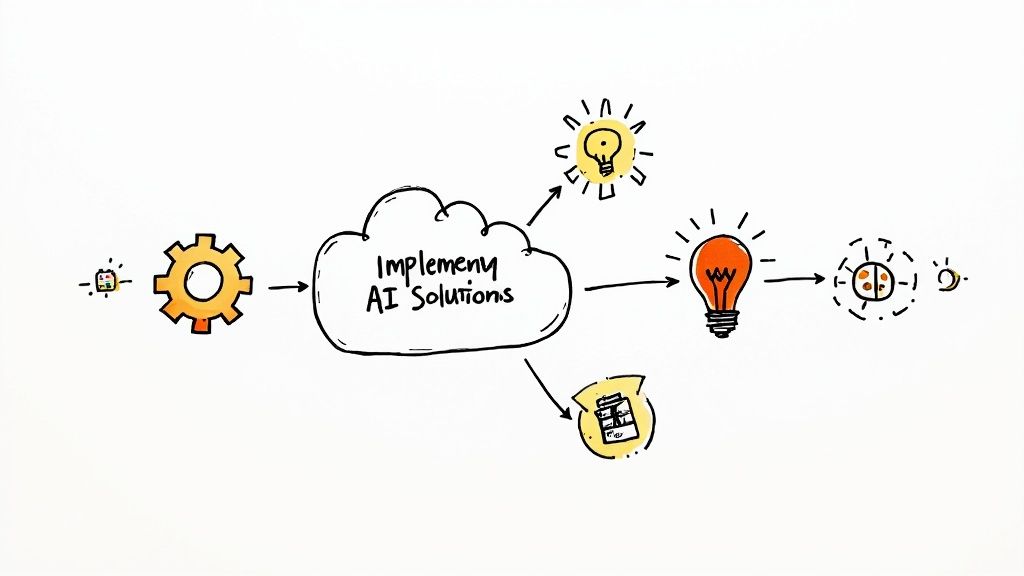
Choosing a partner for your AI journey is probably the most important decision you'll make. Get it right, and you'll accelerate your progress, sidestep common pitfalls, and see real results. Get it wrong, and you could be looking at expensive delays, failed projects, and a team that’s lost its appetite for innovation.
A slick sales pitch or a long list of technical skills isn't enough. You need to find a firm that acts like an extension of your own team—one that gets both the technology and the unique realities of your business. The aim is to find a genuine collaborator, not just another vendor.
This means your vetting process has to be thorough. You're looking at a mix of their technical chops, their feel for your industry, and—just as critically—how well they'll fit with your company culture.
Evaluating Technical Expertise and Industry Acumen
First things first, any potential partner has to know their stuff technically. But "technical skills" is a pretty vague term. You need to dig in and see if their expertise actually lines up with what you need. Do they have a solid track record in the specific area of AI you’re targeting, like natural language processing, computer vision, or predictive analytics?
Just as important is their experience in your industry. A consultant who has already helped a retail company sort out its inventory management will have a much deeper understanding of the sector's challenges than a generalist. They'll speak your language, grasp your operational constraints, and already know the relevant data sources and compliance hurdles.
Look for case studies with measurable results in your sector. A firm that can point to a 30% reduction in operational costs for a business like yours is far more convincing than one that just talks a big game.
When you're checking out a potential partner, prioritise tangible proof over technical promises. A detailed case study from your industry—complete with specific KPIs and business outcomes—is the gold standard for proving they have what it takes to help you.
Key Questions to Ask Potential Partners
To really get a feel for a firm, you have to ask the right questions. The goal is to get past the polished answers and understand how they work, what their principles are, and whether they're truly invested in your success.
Here’s a practical checklist of questions to guide your conversations:
- On Methodology: "Can you walk us through your typical project, from the first discovery session to post-launch support? How do you make sure the project stays on track with our business goals?"
- On Collaboration: "How will you work with our people? What’s your plan for transferring knowledge so our team feels confident managing the solution after you're gone?"
- On Technical Fit: "Looking at our problem, what specific AI models or technologies would you suggest, and why are they a better choice than the alternatives?"
- On Ethics and Governance: "What’s your framework for ethical AI? How do you handle data privacy, model fairness, and transparency? How do you tackle potential bias in your algorithms?"
These sorts of questions push potential partners to show their strategic thinking and prove they’re focused on a true partnership, not just ticking off deliverables.
Analysing Their Team and Collaborative Spirit
At the end of the day, you aren't just hiring a company; you're hiring a team of people. The success of your project will hinge on the chemistry and communication between their consultants and your employees. A great AI consulting for businesses partner takes the time to understand your culture and adapts to it.
As you evaluate them, pay close attention to the people you meet. Do they listen well? Do they ask smart questions about your business, or do they immediately jump to technical jargon? A strong partner will feel like a trusted advisor from the very first chat. Before you sign anything, ask to learn more about the specific people who will be working on your project. Getting a sense of the depth and experience of the consulting team you will work with is a crucial, and often overlooked, step. It ensures the people building your solution have both the skills and the collaborative spirit you need.
Measuring the True Return on Your AI Investment
When you’re trying to justify an AI project, it’s easy to get tunnel-visioned on the immediate numbers. But the real value of artificial intelligence isn’t just about what you can plug into a spreadsheet. While quick financial wins are great, a proper view of Return on Investment (ROI) has to account for both the direct cash benefits and the powerful, long-term strategic advantages that truly reshape a business.
Think of it this way: focusing only on short-term cost savings is like buying a world-class kitchen just to make toast. You're missing out on its true potential. A good AI consulting partner helps you see the complete picture, building a business case that really resonates with stakeholders because it connects the dots between technology and genuine, lasting success.
This means looking beyond the obvious. Of course, you’ll want to track cost reductions. But you also need to find ways to measure improvements in team productivity, the speed of your decision-making, and how happy your customers are. These strategic benefits are often where the biggest wins are hiding.
Looking Beyond Direct Cost Savings
The most straightforward metrics are always the hard numbers—the tangible, easily counted financial gains that come directly from your new AI solution. They’re the foundation of any ROI analysis and provide the clearest initial proof that the project is working.
Here are a few classic examples:
- Direct Revenue Uplift: This is new income directly generated by the AI. An e-commerce business using an AI recommendation engine, for instance, might see a 15% increase in the average order value.
- Operational Cost Reduction: This covers savings from automating manual work or optimising processes. A logistics firm could use an AI-powered routing system to cut its fuel consumption by 10%, which translates into immediate, concrete savings.
- Reduced Error Rates: AI can significantly cut down on the costs of human error, whether it’s in manufacturing quality control or financial data entry.
These numbers are absolutely critical for proving the initial value of the project. But they only tell one part of the story. The strategic gains are what turn a solid project into a game-changer.
Quantifying the Strategic and Indirect Gains
Strategic gains are the less obvious, but often more profound, benefits of AI. They might not pop up on your profit and loss statement right away, but they are powerful engines for future growth and your competitive edge. The key to capturing them is to establish a clear "before-and-after" picture.
The ultimate goal of AI isn’t just to make your current operations more efficient. It’s to build a smarter, more agile, and more resilient organisation for the future. Measuring strategic gains is how you prove this is actually happening.
Let's unpack some of these crucial, though sometimes harder-to-measure, returns:
- Improved Customer Lifetime Value (CLV): AI-powered personalisation creates happier, more loyal customers. By tracking metrics like customer churn rates and how often people make repeat purchases before and after implementation, you can put a number on the increase in CLV.
- Accelerated Speed-to-Market: AI can dramatically shorten the time it takes to develop new products or services. Simply measure the time from concept to launch to see how AI is firing up your innovation engine.
- Enhanced Decision-Making: AI delivers data-driven insights that lead to better, faster decisions. While this can feel intangible, you can survey managers on their confidence levels or track the outcomes of AI-assisted choices versus traditional ones.
- Freed-Up Employee Time for Innovation: When AI takes over the repetitive stuff, your team is free to focus on more valuable, creative work. Track the hours saved and talk to your employees about how they’re redirecting that time towards strategic goals.
This holistic approach is becoming more and more vital. Projections for the German AI market, for instance, show an expected jump from around USD 308.88 million in 2025 to nearly USD 1.36 billion by 2035. This incredible growth is largely driven by companies seeking expert guidance to unlock these deeper strategic benefits. You can discover more insights on Germany's AI market growth to see how consulting is fuelling this trend.
By measuring both the financial and strategic ROI, you can build a powerful narrative that demonstrates the full, transformative impact of your AI investment.
Frequently Asked Questions About AI Consulting
Stepping into the world of AI can feel like navigating uncharted territory. It’s completely normal to have a list of questions before you decide to bring a consulting partner on board. To help you get clear, we've put together answers to the questions we hear most often from business leaders.
How Much Does AI Consulting Cost?
This is usually the first question on everyone's mind, and the honest answer is: it depends. The cost of an AI consulting project is tied directly to the scope, complexity, and how long it’s expected to take. A focused two-week assessment to map out potential AI opportunities will, of course, have a very different price tag than a six-month engagement to build and launch a custom machine learning model.
Good consultants don't offer cookie-cutter pricing. Instead, you'll likely find a few flexible options:
- Project-Based Fees: A fixed price for a project with a crystal-clear scope and set deliverables.
- Retainer Agreements: A monthly fee for continuous advice, system optimisation, and ongoing support.
- Hourly Rates: Best for smaller, specific tasks or when you need some quick strategic input.
Ultimately, the focus should be on value, not just the upfront cost. The right AI project should deliver a return that makes the initial investment look small.
How Long Does a Typical AI Project Take?
Just like costs, timelines can vary significantly based on what you want to achieve. A Proof of Concept (PoC), which is all about testing an idea to see if it has legs, might only take 4-8 weeks. On the other hand, a full-scale implementation—from the initial discovery phase all the way to a company-wide rollout—could easily take 6 to 12 months, sometimes even longer.
A reliable partner will always lay out a detailed project plan with clear milestones. This roadmap isn’t just a formality; it ensures everyone is on the same page and knows what’s happening at every step.
It's tempting to look for a quick fix, but that's not how AI works best. The most successful AI journeys are iterative. You start with a small, focused pilot project to score an early win and prove the value. This builds confidence and momentum for bigger things to come.
What About Our Data Security and Privacy?
This is a big one, and rightly so. Data security should be a deal-breaker. Any AI consultant worth their salt will make data governance and privacy the absolute core of their process. They should be able to walk you through their security protocols, explain exactly how they'll handle your sensitive information, and demonstrate how their solutions comply with regulations like GDPR.
Before you sign anything, make sure a solid Non-Disclosure Agreement (NDA) is in place. Don’t be shy about asking tough questions about their data-handling policies and how they build fair and transparent models to avoid bias. For a deeper dive into this and other topics, feel free to explore our comprehensive AI consulting FAQ section.


